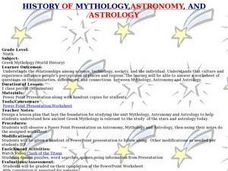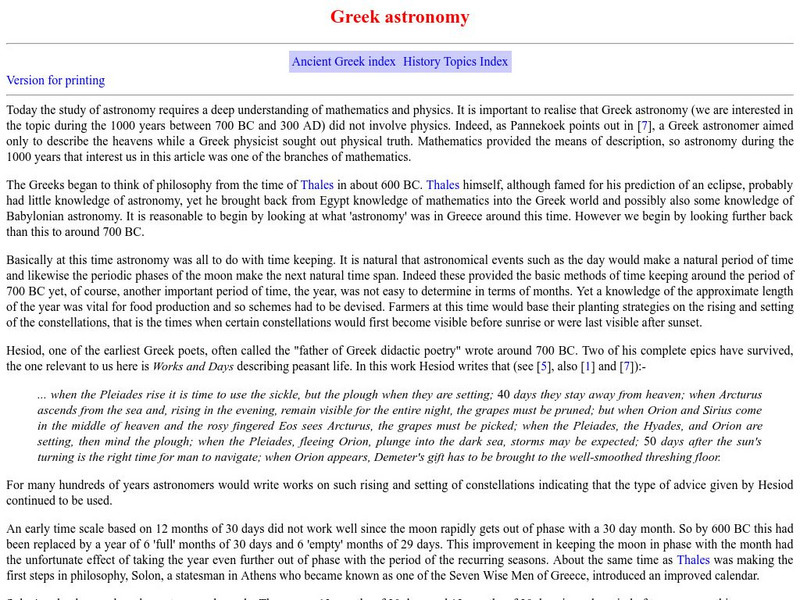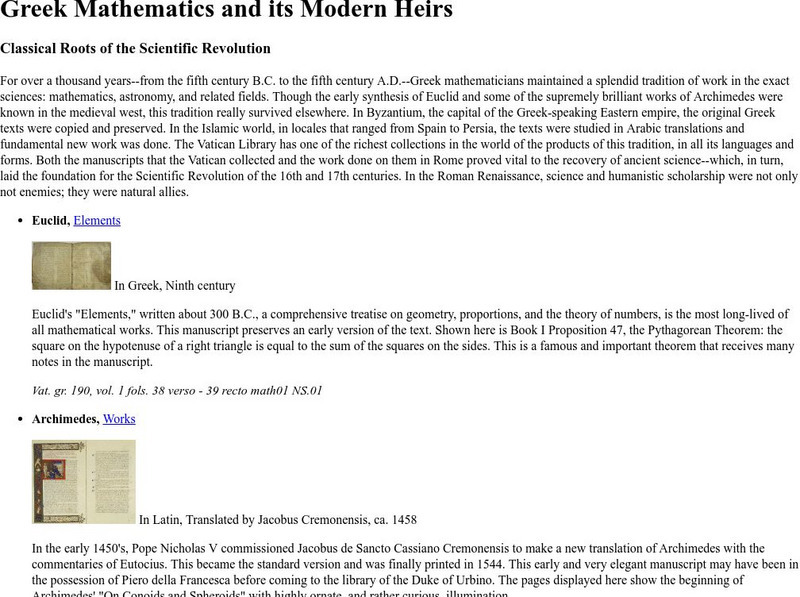Curated OER
Sky Watchers: Ancient Astronomers
Students close their eyes and picture the sky. They are asked to brainstorm things they may see in the course of a night and day, such as the movement of the sun, moon, and stars. Students work in groups to coduct their research. They...
American Museum of Natural History
What is Astronomy?
Go study the universe. Pupils learn seven aspects about astronomy and astronomers. They begin to learn about constellations; distance and motion between objects; gravity; the electromagnetic spectrum; dark matter and energy; and teams of...
Curated OER
Illustrate the Constellations
Students research ancient Greek heroes immortalized in constellations. They choose three constellations in either the summer or winter sky to illustrate and reinforce their understanding of the northern constellations.
Curated OER
Lasting Legacies of Ancient Greece
Ancient Greece lesson plans can open up a world of information for students.
Curated OER
Illustrate the Constellations
Students explore space science by participating in a star identification activity. In this astronomy lesson plan, students identify different star patterns and discuss the movement of stars across the sky as the seasons change. Students...
Curated OER
History of Mythology, Astronomy and Astrology
Ninth graders examine the relationships of science and technology and how it influences people's perceptions of places. In this mythology and astronomy lesson students view a PowerPoint presentation and complete a worksheet.
Curated OER
Sundials
Students investigate the different types of sundials and their history. In this shadows and time of day lesson students build their own sundials.
Curated OER
Flying with Pythagoras
A lengthy narrative about Pythagoras and his students precedes an activity in which your young mathematicians practice using the Pythagorean theorem to solve three problems about flight and distance. Answers are provided.
Curated OER
Asteroids
Students examine the different types of asteroids and how they enter the atmosphere. In this space lesson plan students use mashed potatoes to create an asteroid they can eat.
Curated OER
Pilgrims and Puritans
With graphic organizers galore, learners will follow the changes of church and state in early colonial America. They look at the differences between the pilgrims and the puritans in terms of beliefs and life ways. Myths and...
Curated OER
How Distant is the Moon?--2
Students examine total eclipses of the Sun and their limited regions of totality. They explain that this limited view occurs because the Moon is close enough to us for different points on Earth to view it differently.
Curated OER
Multiculturalism Through African Folk Tales And Mayan Myths
Students study the myths of various African cultures and of the Mayan people. They identify unique characteristics of African myths and Mayan myths. They define and recognize the style and tone of the Mayan myths and create their own...
University of St. Andrews (UK)
University of St. Andrews: Greek Astronomy
Provides an overview of ancient Greek astronomy and the major figures who played a role in developing ideas about the Universe.
Other
Explorable: Ancient Astronomy, Science and the Ancient Greeks
Discusses the influences of other cultures on ancient Greek astronomers, and the advances made by the Greeks. It highlights major astronomers and those who contributed important ideas from the 6th to the 2nd centuries BC, including...
Smithsonian Institution
National Air and Space Museum: Exploring the Planets: Ancient Times & the Greeks
In ancient times only five planets were known: Mercury, Venus, Mars, Jupiter, and Saturn. Learn about Greek astronomer Ptolemy's theory for the solar system that was to survive for fourteen centuries.
World History Encyclopedia
World History Encyclopedia: Greek Astronomy
Looks at the history of Greek astronomy from the 4th century BC on, and the major figures who contributed ideas. Includes a timeline of Greek science.
TED Talks
Ted: Ted Ed: Music and Creativity in Ancient Greece
You think you love music? You have nothing on the Ancient Greek obsession. Every aspect of Greek life was punctuated by song: history, poetry, theater, sports and even astronomy. In fact, music was so important to Greek philosopher Plato...
Other
Ellinogermaniki Agogi: Eratosthenes Experiment
A profile of the ancient Greek mathematician, geographer, and astronomer, Eratosthenes. Looks at his many accomplishments, including measuring the circumference of the Earth and the distance to the Moon and the Sun. Includes links to...
University of Oregon
University of Oregon: Greek Science: Early Cosmology
Discusses the evolution of ideas about the cosmos, from the Magic Cosmology of the Neolithic age to the stage of Mythical Cosmology, to the Geometric Cosmology of the ancient Greeks. The third stage advocated a rational approach to...
Other
Ancient Greek Philosophy: Thales of Miletus
Includes a short summary of the life and work of the Greek philosopher Thales of Miletus. Discusses his life, work in Astronomy and Mathematics, and view of water and pantheism. Also includes a couple of quotations that make reference to...
University of Virginia
University of Virginia: How the Greeks Used Geometry to Understand the Stars
An article explaining how the Greeks were able to use their science and mathematics to predict where astronomical objects such as the Planets could be found in the nighttime sky even though their underlying premise was that the earth did...
University of St. Andrews (UK)
University of St. Andrews: Mac Tutor History of Mathematics Archive
The University of St. Andrews, Scotland, presents hundreds of biographies of famous mathematicians, histories of math in various cultures, and interesting facts on the development of important math concepts. This is a huge reference....
ibiblio
Ibiblio: Greek Mathematics and Its Modern Heirs
This ibiblio.org site discusses the "Classical roots of the scientific revolution," with concentration on the Greek mathematicians from the 5th century BC to the 5th century AD who "Maintained a splendid tradition of work in the exact...
Smithsonian Institution
National Air and Space Museum: Exploring the Planets: Early Discovery
This section of the exhibition gives the history of the discovery and study of space starting with the Greeks and Romans through to the early 1900's.

























